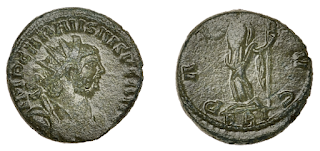One mint mark not discussed on the mints page is the “BRI” mint. So far this is only recorded on a handful of PAX AVG and SALVS AVG coins of an early style. Indeed, when Norman Shiel published “The Episode of Carausius and Allectus” in 1977 he was only able to confirm six examples of this mark with a seventh sketchily described in Numismatic Chronicle as being from a find of Roman coins in Strood in the 1830’s.
The first properly recorded example of this type was a Pax type from Wroxeter found in 1925. The Roman name for Wroxeter is Viriconium and there was the hypothesis, carried through into RIC V (part 2), that this was the place of mintage of the coin. It is perhaps an unfortunate coincidence that B and V can be transposed in classical Latin and thus Viriconium could become corrupted to Briconium.
The finds distribution of the known specimens does not support this as a place of mintage and besides the Wroxter specimen and the probable Strood coin two examples are noted from Richborough and one from Corbridge.
The publication of an updated volume of Roman Imperial Coinage (RIC) covering Carausius and Allectus, volume V. 5 adds a new reverse type, COMES AVG, and an obverse variant too. The current listings are thus:
624: IMP CARAVSIVS P F AVG, radiate, draped and cuirassed bust right, COMES AVG, Victory standing left holding wreath and long branch
625: IMP CARAVSIVS P F AVG, radiate, draped and cuirassed bust right, PAX AVG, PAX standing left holding short branch and vertical sceptre
626: IMP CARAVSIVS P F AV, radiate, draped and cuirassed bust right, SALVS AVG, Salus standing left feeding serpent rising from altar and holding vertical sceptre
627: IMP CARAVSIVS P F AVG, radiate, draped and cuirassed bust right, SALVS AVG, Salus standing left feeding serpent rising from altar and holding vertical sceptre
Using Shiel’s numbering for the coins the specimens known to me are as follows:
|
No Picture |
|
|
Shiel 1 IMP CARAVSIVS PF AVG (rad, dr & cuir bust r) PAX AVG (Pax stg left, transverse sceptre) RIC 1087, RIC V.5 625
Found: Wroxeter
|
Shiel 2 IMP CARAVSIVS PF AVG (rad, dr & cuir bust r) SALVS AVG (Salus stg left, vertical sceptre feeding serpent rising from altar) RIC 1093, RIC V.5 627
Found: ? |
|
|
|
|
Shiel 3 IMP CARAVSIVS PF AVG (rad, dr & cuir bust r) PAX AVG (Pax stg left, transverse sceptre) RIC 1087, RIC V.5 625
Found: Corbridge
|
Shiel 4 IMP CARAVSIVS PF AVG (rad, dr & cuir bust r) SALVS AVG (Salus stg left, altar at feet) RIC 1093, RIC V.5 627
Found: Richborough |
|
|
|
|
Shiel 5 IMP CARAVSIVS PF AVG (rad, dr & cuir bust r) SALVS AVG (Salus stg left, vertical sceptre feeding serpent rising from altar) RIC 1093, RIC V.5 627
Found: Richborough
|
Shiel 6 IMP CARAVSIVS PF AVG (rad, dr & cuir bust r) SALVS AVG (Salus stg left, vertical sceptre feeding serpent rising from altar) RIC 1093, RIC V.5 627
Found: ?, ex F Baldwin collection, current whereabouts unknown, cast in Fitzwilliam Museum, Cambridge. |
|
No Picture |
|
|
Shiel 7 Strood find specimen, reverse type not known, recorded in Numismatic Chronicle Ser. 1 vol 2 (1842?)
|
Supplementary 8 IMP CARAVSIVS PF AVG (rad, dr & cuir bust r) PAX AVG (Pax stg left, vertical sceptre) RIC 1087, RIC V.5 625
Found: “1987” hoard (location unknown), currently in a private coll’n.
|
|
|
|
|
Supplementary 9 IMP CARAVSIVS PF AVG (rad, dr & cuir bust r) SALVS AVG (Salus stg left, vertical sceptre feeding serpent rising from altar) RIC 1093, RIC V.5 627
Found: ?, currently in a private coll’n. |
Supplementary 10 IMP CARAVSIVS PF AVG (rad, dr & cuir bust r) SALVS AVG (Salus stg left, vertical sceptre feeding serpent rising from altar) RIC 1093, RIC V.5 627
Found: ?, currently in a private coll’n.
|
Supplementary 11 IMP CARAVSIVS PF AV (rad, dr & cuir bust r) SALVS AVG (Salus stg left, vertical sceptre feeding serpent rising from altar) RIC - , RIC V.5 626 Found: ?, Baldwin's, September 2017 |
Supplementary 12 IMP CARAVSIVS PF AVG (rad, dr & cuir bust r) PAX AVG (Pax stg left, vertical sceptre) RIC 1087, RIC V.5 625 Found: ?, Ashmolean museum |
| |
|
Supplementary 13 IMP CARAVSIVS PF AVG (rad, dr & cuir bust r) PAX AVG (Pax stg left, vertical sceptre) RIC 1087, RIC V.5 625 Found: ?, Ashmolean museum |
Supplementary 14 IMP CARAVSIVS PF AVG (rad, dr & cuir bust r) PAX AVG (Pax stg left, vertical sceptre) RIC 1087, RIC V.5 625 Found: ?, private coll'n, ex Noonan's 15 Jun 2022, lot 736 |
Supplementary 15 IMP CARAVSIVS PF AVG (rad, dr & cuir bust r) PAX AVG (Pax stg left, vertical sceptre) RIC 1087, RIC V.5 625 Found: ?, ex Leu 7 Jul 2025, lot 3159 |
Supplementary 16 IMP CARAVSIVS PF AVG (rad, dr & cuir bust r) SALVS AVG (Salus stg left, vertical sceptre feeding serpent rising from altar) RIC 1093, RIC V.5 627 Found: ?, Noonan's, 18 July 2023, lot 1369 |
Supplementary 17 IMP CARAVSIVS PF AVG (rad, dr & cuir bust r) COMES AVG (Victory stg left, wreath and long branch) RIC - , RIC V.5 624 Found: ?, ex Lyne coll'n, CNG 127, 17 Sep 2024, lot 601 |
Reverse: 6=9=10
Having said above that the mint is not Wroxeter then where is it? The current hypothesis is that the mint is an early marked incarnation of the London mint, possibly just before or, perhaps more likely, just after the “RSR” mark. The BRI mark itself has been expanded to BRI(tannia), although again there are a couple of alternate expansions to BR(intannia) I(nferior) – ie a location in northern England and also BR(itannia) I (or prima) – southern England.














